May 28, 2018
Wilton, New Hampshire
An excerpt from my journal
Wilton Farm
I am awake at 6:00 a.m. to sunshine streaming through the bedroom window, and arise to make coffee. Back from a day trip to Old Sturbridge Village, I had spent a restless night. But now I had awakened refreshed and ready to write.
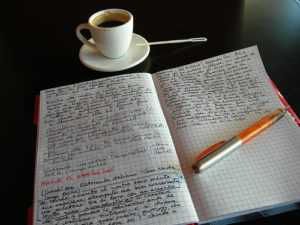 I am staying in a lovely rustic apartment above a barn, loaned to me for a week by my hosts at the Temple-Wilton Community Farm. They have encouraged me to stay here through the morning milking and breakfast, and use that time to write.
I am staying in a lovely rustic apartment above a barn, loaned to me for a week by my hosts at the Temple-Wilton Community Farm. They have encouraged me to stay here through the morning milking and breakfast, and use that time to write.
However, yesterday I downloaded a Kindle version of Dancing with Elephants, a book about coming to terms with terminal illness. The author has Huntington’s Disease and has been using a peaceful approach to his condition. Peaceful rather than the “military” model he believes most of us (and the medical community) use to deal with serious illness. He refers here to the use of phrases such as “We’re going to beat this thing,” “win this war,” “kill those bugs,” etc. Instead he pays attention to his body and tries to live peacefully with each new limitation as it comes. I stayed up late reading his story, and no doubt it was his passionate writing that kept my subconscious awake long after my body was ready to sleep. I realized now that I would have to finish reading the book before I could move my focus back to my memories.
So I continued to read as I ate breakfast, retired to the couch with my coffee, and finished both about 7:30. Then I returned to my writing, enjoying the view out of the window whenever I had to reach for a word, and worked straight through until lunch..
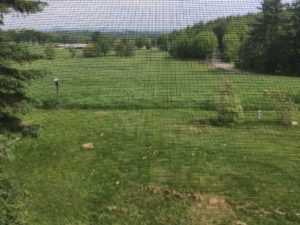 This week has shown me how productive I can be if I write every day, no exceptions. This is a fact known to all successful writers, and to many of us who are less successful. But it is not easy to achieve. During my career as a college instructor, while balancing single parenthood and a love of reading, writing, hiking, and gardening, I worked hard to perfect the art of multi-tasking. It was important to me to “balance” my life, to include “want to’s” in with the “have to’s.” Following retirement, I had to pare down the number of activities I tried to accomplish in a day, but there were still too many, and writing often got pushed aside.
This week has shown me how productive I can be if I write every day, no exceptions. This is a fact known to all successful writers, and to many of us who are less successful. But it is not easy to achieve. During my career as a college instructor, while balancing single parenthood and a love of reading, writing, hiking, and gardening, I worked hard to perfect the art of multi-tasking. It was important to me to “balance” my life, to include “want to’s” in with the “have to’s.” Following retirement, I had to pare down the number of activities I tried to accomplish in a day, but there were still too many, and writing often got pushed aside.
Dancing with Elephants
The author of Dancing with Elephants considers aging to be a terminal disease. He encourages a mindful approach to the physical effects of aging, to embrace them rather than fight them. Following his advice may help me to achieve my writing goals more readily. Here are the key passages:
“Don’t cry for me, my friends. I have been enjoying practicing the embracing of weaknesses—more specifically, how to rock tunnel vision. While the “successful” strive for an endless stream of multitasking, I have been (re) exploring the one-thing-at-a-time method. Aging and my Huntington’s disease have combined to strip me of any illusion that I might be able to multitask my way to anywhere.
“In the “normal world,” people expect multitasking. We are expected to get things done while at the same “time responding to waves of emails, Facebook posts, phone calls, tweets, newsfeeds… But I have been learning to lean into what I saw as my weakness and that which I feared. I have a one-track mind. And I am celebrating it. I have a deep, burning desire to focus all my attention on one thing until it is finished. Rather than fight this, I experiment with living into it. I have completed a number of big tasks this way: painting our cabin, creating a book and a blog, refinishing the kitchen, redoing hardwood floors. However, to do this, I have had to ignore everything else.
“I don’t respond to friends and family. I don’t pay bills. I don’t clean the home. I avoid all social settings…. Elephant dancers need to embrace weakness if they are to flourish. Therefore, I am sharing with you four secrets to rocking tunnel vision – or whatever it is that you fear within yourself.” (From Dancing with Elephants: Mindfulness Training For Those Living With Dementia, Chronic Illness or an Aging Brain by Jarem Sawatsky.)
Reading this, I thought of my own decreasing ability to multi-task, and how I have been fighting it, defining it as a weakness. Instead, perhaps I should be embracing this new focused (tunnel vision) way of looking at a project. I’d like to be able to code switch, work on a blog post for a while then read student papers, then write a scene from my book. I don’t, however, need to have all three projects open on my desktop at the same time. In fact, I cannot, not any more. I have been trying to juggle too many projects at once, and I am not doing any of them very well.
You’ll have to read Sawatsky’s book to learn his four secrets, but what I learned is that if I am going to finish writing my book this summer I need to make that project the major focus of my tunnel vision. I need to work on it every day, especially in the prime time of my creativity, the early morning. Other activities, like reading student assignments and drafting blog posts, I will work on in the evenings. I will leave the breakfast dishes until the afternoon. I can think about my writing project while I walk Kismet, my faithful canine companion (who sits on my feet when I am properly at my desk). The bills can wait until the first of the month. My social life is on hold. So if you wonder why I’m not answering my telephone or returning texts this summer, that’s why.
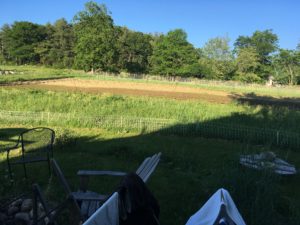 It is now early evening. I am sitting outside the main farmhouse in the shade, enjoying the feel of my hair being ruffled by the warm breeze. The farm apprentices’ laundry is drying on clothes lines and on various pieces of farm furniture. I can hear the agitated mooing of the cows as they are being herded in for milking. Beyond where I sit is the newest vegetable patch, just beginning to show seedlings above the soil. The calmness of the farm in the evening feeds my soul. This writing week has been about more than writing. It also has been about embracing my own increasing desire to focus on one thing at a time, and to give whatever I am doing my full attention. With the popularity of mindfulness and living in the moment, I can’t believe I hadn’t figured this out before.
It is now early evening. I am sitting outside the main farmhouse in the shade, enjoying the feel of my hair being ruffled by the warm breeze. The farm apprentices’ laundry is drying on clothes lines and on various pieces of farm furniture. I can hear the agitated mooing of the cows as they are being herded in for milking. Beyond where I sit is the newest vegetable patch, just beginning to show seedlings above the soil. The calmness of the farm in the evening feeds my soul. This writing week has been about more than writing. It also has been about embracing my own increasing desire to focus on one thing at a time, and to give whatever I am doing my full attention. With the popularity of mindfulness and living in the moment, I can’t believe I hadn’t figured this out before.
What is your experience with multi-tasking? Do you embrace it, continue to try to optimize your use of time? Or are you, like me, learning to live in the present moment, to focus on only one thing at a time? Which do you find most rewarding?
I’d love to know what you think.
Share this post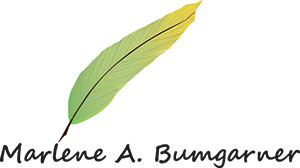
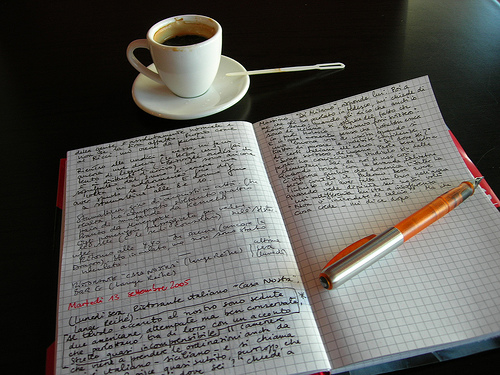
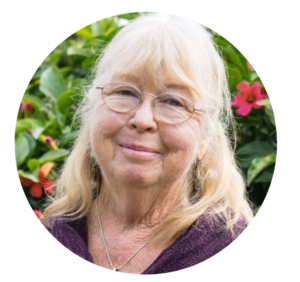


Your writing brings stillness to my soul
I found you through sixty and me.
I am 78. Your word are my thoughts. Thank you
Thank you, Karen!
I live in the moment, or at least try. Work requires multi-tasking, but when home I focus on one major project at a time.
Marlene, I really enjoy your writings. Especially associated with aging. It calms some of my fears of my own aging issues. I feel you are still a mentor to me after all these years through your writings.
You inspire and show me that I too can “keep on trucking into the golden years” with grace and spirit. Just gotta be a bit more mindful of my own abilities, and to learn to take care of me instead of everyone and everything else in between! 🤪
Dena,
If you are already living in the moment, you are more than half way there! (Wherever there is.) I’m so pleased that what I write has meaning for you, and that you draw confidence from my experiences. I have had some wonderful mentors who went before me, and it gives me joy to be able to do the same for others.